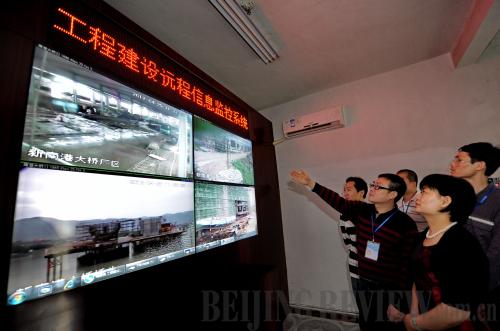|
 |
|
CLOSE WATCH: Discipline inspectors monitor a construction project with remote surveillance cameras in Minhou County, southeast China's Fujian Province, on April 25 (ZHANG GUOJUN) |
Among them, more than 200,000 were transferred to prosecutors for involvement in legal infringements, the CCDI statement said.
Former Minister of Railways Liu Zhijun was expelled from the CPC following an investigation into allegations of corruption in May. His case has been handed over to judicial departments.
On July 2, Liu Zhuozhi, former Vice Chairman of Inner Mongolia Autonomous Region, was convicted of taking bribes totaling 8.17 million yuan ($1.29 million) and sentenced to life imprisonment.
In December 2010, China issued its first-ever white paper on the anti-graft efforts, which says that combating corruption and building a clean government is related to China's national development, the fundamental interests of the overwhelming majority of the Chinese people, social fairness, justice, harmony and stability.
China has adopted the principle of addressing both symptoms and root causes of corruption, enforcing comprehensive treatment, simultaneously stressing punishment and prevention while giving priority to prevention, according to the white paper.
The document also quotes a survey conducted by the National Bureau of Statistics (NBS), which shows that the Chinese public's overall satisfaction rate of the government's efforts to combat corruption and build a clean government rose steadily from 51.9 percent in 2003 to 70.6 percent in 2010. Another NBS survey in the white paper shows that 83.8 percent of Chinese thought corruption had been kept down to "varying extents" in 2010.
Prevention—a priority
Great efforts have been made in improving the systems to prevent corruption and restrict the power of officials, Li said.
Over the past decade, discipline inspection agencies have initiated supervision and inspection on related departments and officials since the major government action started, he said.
Citing the Beijing Olympic Games in 2008 and the World Expo in Shanghai in 2010 as examples, he said inspectors were sent to supervise the preparation of the events from the beginning.
"Checking departments and officials in charge of major projects has become a regular form of supervision," Li said. "Such precautionary measures have proven more effective than handing down punishments when damages have been done."
Similar inspection teams were also sent by the Central Government around China to monitor local governments' use of funds for stimulating the economy following the outbreak of the global financial crisis in 2008, the post-earthquake reconstruction projects and use of donations in Wenchuan, Sichuan Province, and Yushu, Qinghai Province, and the preparation of Asian Games in Guangzhou, capital of Guangdong Province, in 2010.
The CPC started large-scale efforts to curb corruption among Party and government officials about two decades ago and, in the past decade, efforts have been stepped up, Li said.
The CCDI launched several special campaigns targeting outstanding problems, such as excessive overseas travels funded by government, bribery in contracting of construction projects, securities and assets that should but fail to be listed in accounts.
By 2011, the CCDI had investigated about 21,000 graft cases after inspecting more than 425,000 government-funded construction projects across the country, and exposed more than 60,000 off-book accounts leading to punishment of more than 10,000 officials.
The Party also responded fast to cases drawing severe public complaints, such as those related to workplace safety, food safety and environmental pollution.
Over the past five years, more than 700 officials were punished for being responsible for workplace accidents.
Also, the country founded its first national corruption prevention bureau in 2007 to reform the supervision system on officials and develop new anti-corruption policies.
A string of policies to improve government transparency, curb the misuse of power and police the behaviors of senior officials have been issued over the past few years.
In February 2010, the CPC Central Committee issued a code of ethics for CPC cadres to follow to ensure clean practice in their work. The guidelines specify 52 unacceptable practices with respect to CPC leaders and cadres of various levels, including accepting cash or financial instruments as gifts, and using their influence to benefit their spouses, children or "special concerned persons" with regards to their employment, stock trading or business.
"The battle against corruption will be tough and tedious, but with persistent efforts, the future will be bright," Li said.
Email us at: lili@bjreview.com | 